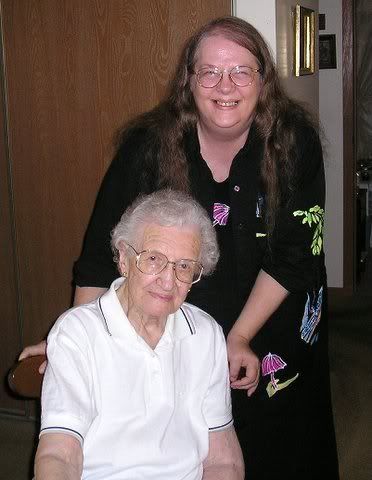This turns out to being a good ending
Start comments between the Good Dr. … and us :)Topic: Summaries for Unit Discussion Questions
Date: March 17, 2007 4:27 AM
Subject: Response to Dr. … from Ann
Author: Garvey, Ann
Last edited on: March 17, 2007 4:59 AM
We struggle with this question at the center, but perhaps "as" the center. Our stated mission is that we want to help people become more independent and parts of their communities. You've probably heard this before from us and by now most likely you know that Sr. our boss demands quite a bit and that sometimes we clash, because I hold toward independence and tolerance and she's for conformance and obedience. For a second we want to look at this … we know your saying to yourself … Ann you've got 4 more papers go back to writing!
I have no doubt that sister has been raised over the last 58 years of being a nun to comply to her communities wishes and that they've been trained to obey their superiors. I been grappling with the behaviors between the two of us, especially because of the early abuses. I was also trained in our family to conform and be obedient. It seems in both situations I rebel. I want to think for myself. But, in the same consideration, I have learned from Sister and I admire her consistency in getting work completed and I realize that the Sisters allow for quite a bit of freedom within the accomplishments of their goals and mission. They might say minister the word of God, but I don't believe they teach the sisters how to do that. I know there are guidelines like prayers and scriptures, but I feel those things need to come individually from the heart if they are to make any real difference. In the same respect, Sister has never stepped in and said, this is how you do your job. Usually, she starts of with her criticisms … your work is excellent, but … then she goes in to chastising me for my slow speed or that I try to do too many new things. Maybe these are her guidelines. But, then she lets me go for weeks without checking me directly and that to me is independence. I also know that if I get too far behind, or if she's angry with me, Sister will step in to as our friend says "micromanage." It usually makes me pretty crabby. It is very infrequently though that she will "chase me down" to the point of coming to my office. She allows us that sanctuary. And, although she lives at the center/convent in back, I don't have the impression she invades my privacy by going through desk or files. She's not invasive like that.
I'd like to think that she demands respect and discipline and that's the fine line we cross with the clients. When they come into one of my groups I want them to listen to others politely, but I want them to have their own thoughts. I figure with both Sister and the clients … it's going to be my task to continue listening and learning, until we can learn to understand each other and that becomes a part of me being myself, but tolerant.
Teach by leading out? My impression of the Prime of Miss Jean Brodie
Topic: Summaries for Unit Discussion Questions
Date: March 17, 2007 10:21 AM
Subject: Re:Response to Dr… from Ann
Author: Dr. …
Hi Ann,You have an interesting and complicated philosophy. You are a good writer and you seem to enjoy writing. Have you ever considered writing? You have significant thoughts and ideas to share.Thanks for all your words of wisdom.
Topic: Summaries for Unit Discussion Questions
Date: March 17, 2007 12:26 PM
Subject: Re:Response to Dr. … from Ann II
Author: Garvey, Ann
Thank you Dr. …,I've looked forward to your thoughts. Some people say that we're confused. Complicated seems dark and mysterious. I kind of like that. Thank you for the writing compliment. I do enjoy writing it starts from the time I get up to the time I go to bed. My goal with my graduate degree is to write programming books for adults with developmental disabilities. I think this is an important need to fulfill. Again Thank you,Ann
End comments
Ok, we are back … hmmm, it says this is 12 point, but I’m not too sure of that … seems like big letters. Ahh well, Blogger always standardizes everything.
I’m not sure if I’m back here with good new or bad. The good news is that the Dr. commented in a nice way to something I’d said … see above. The bad part is that I may have and most likely just flunked social psychology. There was a note in the room about 11:15, when I had gone in. It goes to all the students. It says that everything had to be in by noon. This is the note I sent in. She seems pretty firm set though.
From: Garvey, Ann To: Dr. …
CC: BCC: Subject: Sunday deadline
Sent: March 17, 2007 11:43 AM
Dear Dr. …,When I read your message I understood that I had until Sunday to complete the assignments. I am on track for getting that work completed, but now from the announcement it seems that the deadline is in a half an hour ... I went back to read your email and I could see the confusion in how each of us were using the word assignment. But, the thinking in my head was that although you weren't giving me the extra week, I had at least Sunday to complete the last assignments. I am working as quickly as I can, but - in that for the final assignments I only had to Sunday, which wasn't a week. Now, you are going to tell me I can't hand in my work? I also stated a week previous that I would need an incomplete and extension of time to finish my final paper, hopefully within the next two weeks. If I am not allowed until Sunday to finish the regular assignments, does that mean I will not be able to finish on extension the final paper?Please help me understand this. Are you telling me its over and I have now flunked??? You have known my disability affects my ability to schedule as appropriately as others ... I had not stopped trying, are we now stopped??
Ann
It makes me feel like a floundering idiot. I don’t think I really am and I don’t want to hear any more negative talk from us. I’ve been trying to deal with this for almost the last couple of hours. We did eat some crackers for lunch and we started a second pot of coffee. We usually don’t, but figured we needed to stay charged if we are going to continue working. That’s pretty much where we are at right now … we’re going to continue and finish the course. She most likely is not going to allow the work to go in, but I don’t know how to stop midstream and just say its over after having put so much into it. There’s this thing going on inside me that says I’m only learning if I am reading and writing. I can write the rest of the weekend about my failure, or I can continue to learn. That seems to be the better option and I’m sure that Dr. Marvin would approve.

Have to be cognizant of the time. According to the initial schedule … I think I’m now behind. These last couple hours have been devastating. I don’t want to think yet what it means to my grade point average or probation. Let’s not go there, k? It would … ok we’re going to go there. It means that we’ve gone down to the second level probation. The worst part is that it not only lowers my grade point average. It means repeating another course. Somehow I gotta figure out how in hell I’m going to keep a deadline. SHHHHHHHHHHHHHHH ok you that’s ENOUGH of THAT!!!

You are just feeling sorry for yourself. Get over it. It’s happening and so far we’ve done our best. Just got to do something that will improve that. AGAIN, I don’t know any other better way to adjust than just do the work. Finish the course whether or not you could be graded.
That’s the deal, k???

Ok, that’s final. You are a writer so you’re going to write and we’re going to be here writing with you. NOW … I will stop capitalizing if you can just clear your head. Focus … That’s what it is all about … focus. And, I don’t want any of this negativity to show up in the paper. Ok, Understand? Ok, now … according to the new schedule … you have one hour and 16 minutes to do your researching … do you want to take advantage of that? Yes maam. Ok. You know what you got with the school. Why don’t you go through that and pull what you need and then get over to the library, k? we haven’t given up on you or the school, k?

Just gotta learn to meet deadlines. Let’s start now … shoo…
Start Paper here…
*sigh*
Topic: u09d2 Group Cohesion
Date: March 17, 2007 6:52 PM
Subject: In response to the assignment from Ann
Author: Garvey, Ann
Last edited on: March 17, 2007 6:54 PM
Brehm, Kassin, & Fein (2005, p. 278) state there are three essential components of groups; roles, norms, and cohesiveness. Given the task of increasing group cohesiveness, we define cohesion as that which pushes the group members together and we note as an aside that cohesion sometimes correlates with group performance (p. 279). Group roles can be formed to complete tasks or be for support/maintenance (p. 278). And, norms can be defined as the group’s “rules of conduct” and be either formal (written), or informal (subtle) (p. 279). In the previous paper, we discussed the center where I work. The center, like other groups, has essential components that include roles, norms, and cohesiveness. I would like to assert that the sisters’ spirituality and hard work is what increases the group cohesiveness. That is not to say that more sisters would make the group more cohesive, although that might happen. I am thinking that due to the sisters’ religious roles, the center has become an extension of their support and purpose, and in addition, it provides the membership with rules of conduct.
Wow, that is a driven statement hard in the making. Can I back that up? Let’s start with roles. The easier set to think through is that of the individuals and staff. The individuals who attend the center’s program take on a role within the community as does the lay staff. The center appears to be balanced between the roles of the individuals served, the staff, and the Administrator. The Administrator has the role of being the spiritual leader and perhaps falsely, but here we will add, she is the disciplinarian. It has been reported that those in the religious community contribute to the whole a sense of connection, meaning from interacting with significant others, realization of self value, intentionality and cultivation of adult life demands, and a reflective identity emphasizing patterns of continuity and change (Kiesling, Sorell, Montgomery, & Colwell, 2006, p. 1276).
Perhaps it would be a good idea to support the strength of that statement with some examples. Although it is tempting to use ourselves as thought models, I will try to think through the Sister’s relationship to the individuals served. One example of an individual who has gained the sense of connection through sister would be a female who has a speech impediment. This individual came to the center with a particular statement structure that drew the attention of the Sister. She would say things such as, “Me likes to read” or “Me want to go outside.” Although, this individual had reached her 21rst year, she hung on to the confusion of pronouns. Sister initiated where others had shrugged, and then taught the staff to correct. It will take a long time for it to sink in, but for now when I hear the “me” and I correct with “I” the individual blossoms into a fruitful smile, and she will repeat after you with a little bow and hand held over her heart. She says, “I want to …” It had given her a sense of connection to be the feature of her own attention and that of the center. She has become a projection of Sister’s work.
This leads to the next statement. I venture to say that anyone who meets Sister knows that they have met someone. We had a discussion a couple of weeks ago with the individuals served in a large group. I had the task of going over with them the grievance procedures. I spoke to them as one and I asked, “Who do you go to when you have a problem?” They answered, “We go to the staff.” I asked “What happens if you have a problem with your staff?” They looked doubtful, but answered, in general, “You go to your QMRP.” This is my position and that of one of my peers. It is considered a middle-man counselor/social worker role. I said, “Good.” Now, what happens I’m in real lousy mood and decide to kick someone?” I picked someone in the group who doesn’t usually say too much. There were groans and moans. “You can’t kick him! You’re supposed to be nice to people!” They finally decided that they would need to tell the Sr. I said, “Great! Now, what happens if Sister decided to eat your lunch?” They were very dismayed and claimed that Sister wouldn’t do that because it wasn’t right. But, I pushed forward, but what would happen if she did? The consensus of the group at that time was … “Well, we would just have to give Sister our lunch.” I had to eventually switch topics, because I couldn’t get them to commit to the point that Sister could do something wrong. When one is interacting with sister, you are interacting with a significant other and that seems to stick with you.
In realization of self value … I would have to explain the great amount of time and attention Sister has given to the group as a chorus. Each morning in chapel she painstakingly goes over songs over and over again as if it had never occurred to her that the individuals couldn’t possibly learn all the words she was teaching them. In actuality, I am amazed in listening to the group; because it never occurs to them either that they can’t sing anything the Sister suggests. About a year and a half ago, Sister took this one step further. She hired a dance specialist to come in twice a week. It had started with tambourines, recorders, clackers, and percussion and it led to ambitions so great the groups gained a function at the annual fundraiser. Last year they performed to “We are Family,” and “Singing in the Rain.” I have not heard the pieces they will be performing this year, but they practice daily with Sister very animatedly directing. It seems as if she was dismayed last year because not all of the individuals responded, so this year my understanding is she is giving them a special chance to perform. I caught a second of it. “Clackers” were passed out to each and every one of them, and when I’d left of she was yelling, which hand she expected them to be in. My thought here is that … there is no one in that group who doesn’t feel their sense of value. They were all clacking no matter what the general ability level.
For brevity, I won’t continue with the examples, but I would like to draw back into the spirituality aspect. Sometimes when I’m leaving for the day, I will go past the chapel and Sister is there sometimes alone and sometimes with the other Sister that lives in the attached convent. I know that the Sisters start their morning and end there day in prayer. I don’t know all the entirety of their service, but I know when Sister has questioned how we were going to make financial due, she’s announced that she is going to pray over it. Over the years, I can’t help but to have imagined how often sister has prayed over me. “Please make Ann go faster!” Well, she doesn’t say that, but I can imagine it, because by the next morning as I try to sneak past her desk, she seems to have a new tact in making sure that I am attending to the things on her list. Sometimes it’s things I’ve worried over for weeks and sometimes it’s something simple like a failure to print a document or a request that I respond to the state or a parent. I frequently leave her office saying, “Yes Sister, I will take care of that right away.” Because Sister has never entirely given up with me, I assume she must be very spiritual indeed.
I found one resource that was 83 years old. I’ve heard whispered that Sister was almost 80. It was a directive in how to handle religious norms and suggested means to score and rate the building, equipment and textbooks used for training purposes. It also offered a series of test to figure out how well students were learning about Bible knowledge (Kulp, 1924, p. 70). I thought how much this applied to Sister. I thought this was how she was taught. God said, build me a boat. The sisters provide the foundation of people’s lives. They tell you to keep moving, jump, jump how high, and while you’re at it, help out the next person. The material sanctions were something that I’d noted at the beginning of my tour of duty. When a new staff/teacher asks what they will teach with, she is told to open the cupboard door. What’s in there … eh, a little of this or that, not much, but that becomes the transformational tool that all learning will take place. It always brings a smile to my face in thinking of how the one staff learned to make a math assignment out of grouping plastic knives by ten. I think this is spiritual and I think this is how you increase the cohesion of groups. You give them some elementary tools, a prayer, and the message to go forward. God … he’s working your hands too.
One last researcher contributed to the discussion and then I will end here. Dion (2000, p. 22) studied the effects of cohesion in psychology from the 50’s on … After this study he concluded a present day analysis of cohesion, which was to include the primary dimensions of “social cohesion, task cohesion, vertical cohesion, and belongingness.” So, I ran this past the “Sister Spiritual curve.” When you ask the individuals served why they come to the center, one of their first answers is that they say they want to be with their friends. We can check off that Sister’s center has plenty of social … I smile sadly to think missing work yesterday meant foregoing the pizza party that occurred due to the St. Patty’s Day celebrating. Task cohesion driven home by the Sister – it is the manner in which the program falls together. Part of the time the individuals perform in the workshop, but at other times they are learning social skills, food preparation, motor skills, community awareness, etc. Vertical cohesion is what we have been speaking of in that the center membership each has a relationship to Sr. Not only does Sister appear in the group’s eyes first thing in the morning, she usually checks rooms, has an office with an open glass window, monitors lunch, and often sees that people are getting into their transportation vehicles correctly. Lastly, belongingness; is there reason to doubt? “To be religious is (1) to recognize that creative interaction is going on, (2) to search it out, and (3) to yield to it” (Wells, 1936, p. 301).
Reference
Brehm, S. S., Kassin, S., & Fein, S. (2005). Social psychology [6th ed.]. Boston: Houghton Mifflin Company.
Dion, K. L. (2000, March). Group cohesion: from 'field of forces' to multidimensional construct. Group Dynamics: Theory, Research, and Practice, 4(1), 7-26.
Kiesling, C., Sorell, G. T., Montgomery, M. J., & Colwell, R. K. (2006). Identity and spirituality: A psychosocial exploration of the sense of spiritual self. Developmental Psychology, 42(6), 1269-1277.
Kulp, D. H. II (1924). Measurements and norms in religious education. Journal of Educational Psychology, 17(1), 70-71.
Wells, G., R. (1936, April). Normative psychology of religion. Psychological Bulletin, 33(4), 300-302.
End Paper here…
















